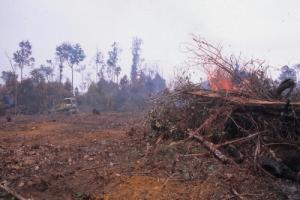Climate Change in Indonesia :
The devastating impact of global warming is already evident in Indonesia and will likely worsen due to further human-induced climate change, warns WWF.
The review from the global conservation organization, Climate Change in Indonesia – Implications for Humans and Nature, highlights that annual rainfall in the world’s fourth most populous nation is already down by 2 to 3 per cent, and the seasons are changing.
The combination of high population density and high levels of biodiversity, together with a staggering 80,000 kilometres of coastline and 17,500 islands, makes Indonesia one of the most vulnerable countries to the impacts of climate change.  Cleaning forest fire for palm oil plantation (Slash & Burn) Central Kalimantan, Indonesia. Indonesia is a significant emitter of greenhouse gases due to deforestation and land-use change. (Credit: Copyright WWF-Canon / Alain Compost)
Cleaning forest fire for palm oil plantation (Slash & Burn) Central Kalimantan, Indonesia. Indonesia is a significant emitter of greenhouse gases due to deforestation and land-use change. (Credit: Copyright WWF-Canon / Alain Compost)
Shifting weather patterns have made it increasingly difficult for Indonesian farmers to decide when to plant their crops, and erratic droughts and rainfall has led to crop failures. A recent study by a local research institute said that Indonesia had lost 300,000 tonnes of crop production every year between 1992-2000, three times the annual loss in the previous decade.
Climate change in Indonesia means millions of fishermen are also facing harsher weather conditions, while dwindling fish stocks affect their income. Indonesia’s 40 million poor, including farmers and fishermen, will be the worst affected due to threats including rising sea levels, prolonged droughts and tropical cyclones, the report said.
“As rainfall decreases during critical times of the year this translates into higher drought risk, consequently a decrease in crop yields, economic instability and drastically more undernourished people,” says Fitrian Ardiansyah, Director of WWF-Indonesia’s Climate and Energy Programme. “This will undo Indonesia’s progress against poverty and food insecurity.”
WWF’s review shows that increased rainfall during already wet times of the year may lead to high flood risk, such as the Jakarta flood of February this year that killed more than 65 people and displaced nearly half a million people, with economic losses of US$450 million.
Climate change impacts are noticeable throughout the Asia-Pacific region. More frequent and severe heat waves, floods, extreme weather events and prolonged droughts will continue to lead to increased injury, illness and death. Continued warming temperatures will also increase the number of malaria and dengue fever cases and lead to an increase in other infectious diseases as a result of poor nutrition due to food production disruption.
“The Indonesian government must take its role seriously and lead the way in the fight against global climate change,” says Mubariq Ahmed, Executive Director and CEO of WWF-Indonesia. “Indonesia has to take up the challenge of climate change, putting climate adaption into the development agenda, promoting sustainable land use, as well as demanding support from industrialized nations.”
Indonesia is already a significant emitter of greenhouse gases due to deforestation and land-use change, estimated at 2 million hectares per year and accounts for 85 per cent of the country’s annual greenhouse gas emissions. It is also a serious coal producer and user in the region.
“The government of Indonesia knows how important action against climate change is for their own country and people, and it has put a lot of work into steering the Bali negotiations,” says Hans Verolme, Director of WWF’s Global Climate Change Programme.
No one can escape from climate change in Indonesia. But the effects will be felt more acutely by the poorest people, who are living in the most marginal areas that are vulnerable to drought, for example, or to floods and landslide. Developed countries are responsible for the majority of greenhouse gas emissions which cause global warming, said United Nations Development Programme’s Country Director Hakan Bjorkman. “The poor walk the earth with very light carbon footprint,” Bjorkman said, but “they are set to suffer the most from the actions of a few.”
Material sourced from: World Wildlife Fund (2007, December 3). Indonesia At Risk: Climate Change Threatens People And Nature. ScienceDaily.
Reuters (2007, November 28) Indonesia Losing Crops, Fish Stocks to Global Warming, Planet Ark.
